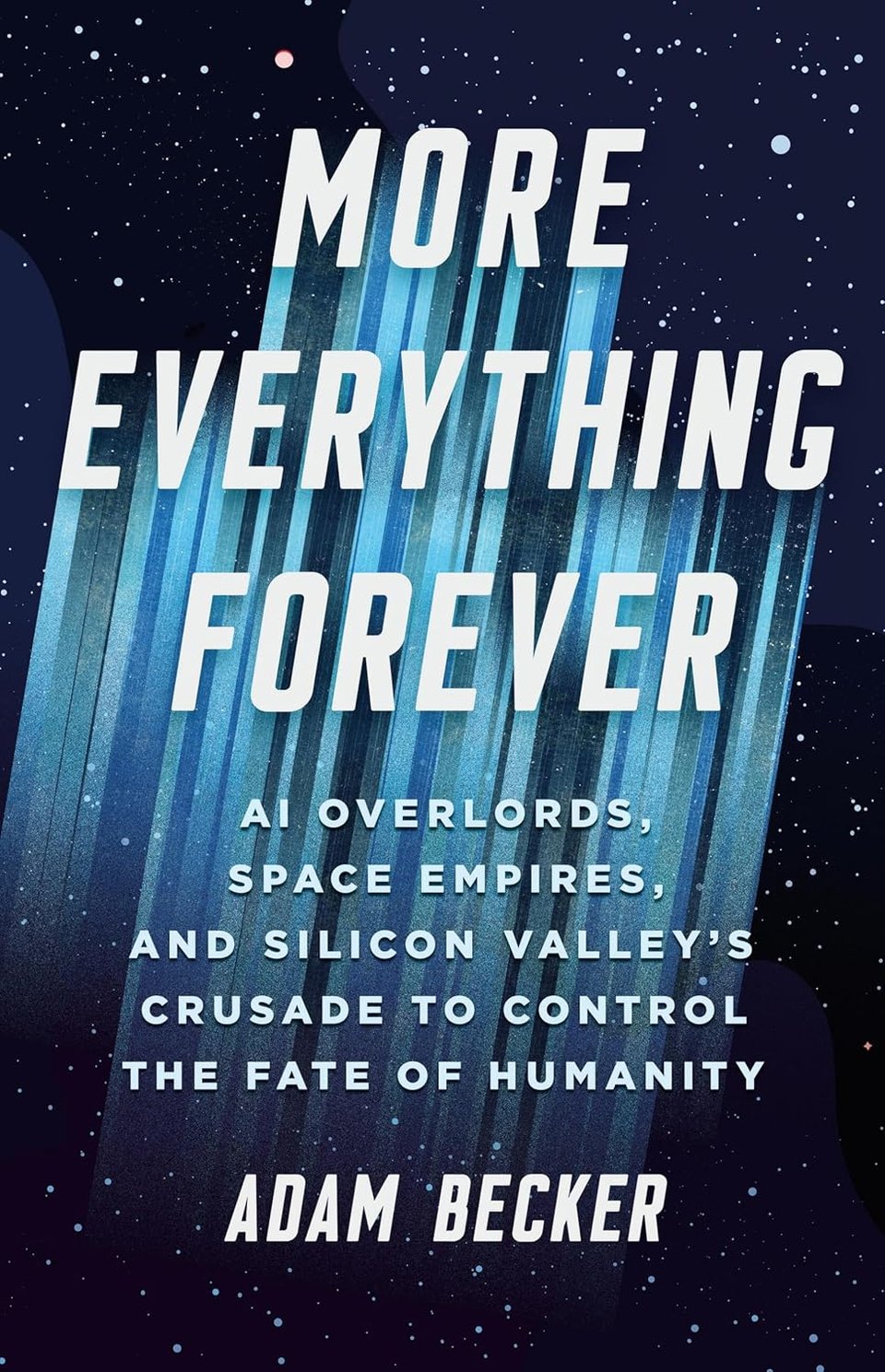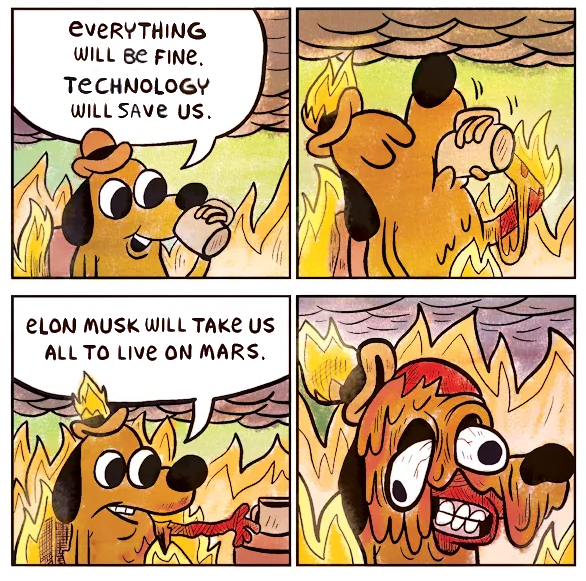We're never going to Mars
I aired a fireball of an interview this week on Techtonic. Adam Becker joined me to talk about his new book More Everything Forever: AI Overlords, Space Empires, and Silicon Valley's Crusade to Control the Fate of Humanity. It’s one of the best tech books in recent memory.

And here’s the twist: Becker has never worked in the tech industry. He’s a science journalist with a PhD in astrophysics. (His previous book, What Is Real?, was about the quantum realm.)
The reason an astrophysicist can, and should, write about the tech industry is because the billionaire bros have an unfortunate, even cliched at this point, desire to go to space. They want to move to Mars, colonize the galaxy, and upload their minds to a cosmic digital cloud. Perhaps most importantly, given the fear that drives the whole project, they want to live forever.
None of these are ever going to happen.
I’ve known for years that these space-colonization plans were misguided. Even more ridiculous were the ideas about mind-uploading and immortality. But I lacked the specialist’s eye to prove exactly why they would never come to pass. Becker’s background allows him to take apart each of these claims.
For example, contrary to Elon Musk’s hype, there is no chance that we’ll ever create a self-sustaining colony on Mars. As Becker points out, the thin Martian atmosphere isn’t habitable, the radiation levels are off the charts, and the dirt is poison.
Even if, at enormous expense, humanity eventually could land a few people on the planet, their only chance for survival would come from living in underground caves (covered in poisonous dirt), supported by constant replenishment from Earth. Musk’s idea of a self-sufficient civilization there, as a “backup of Earth” in case of disaster here, is laughably wrong. (Adam and I share some good laughs in the interview.)
We’re never going to Mars. Except for some possible missions with a few astronauts, as we did with the moon landings, humanity isn’t going anywhere. Mars, with all its challenges, is the least difficult planet in the solar system to send humans. Becker writes about the other planets and moons and the utter impossibility of building permanent settlements there.
This means that we’re here on Earth to stay. The science is clear. Yet the billionaires – who claim to be devoted to rationality – continue to pour billions of dollars into causes like longtermism and effective accelerationism that promise a future in the stars. Why the disconnect?
One reason, as Becker and I discuss, is that sci-fi dreams of space are pleasant distractions from the difficult reality here on Earth. Urgent problems like climate change demand a thoughtful, sustained, collective response from humanity. The tech billionaires – whose businesses increasingly contribute to the problem of climate change (through, for example, AI data centers) – have little interest in honestly addressing the issue. It’s so much more convenient to point to a shiny utopian fantasy floating somewhere in the galaxy.
There’s another unpleasant reality that the billionaire bros want to avoid: death. Despite their youth, their health, and their mountainous hoard of wealth, each and every one of these guys is going to die. I imagine it’s difficult for them to accept, given how rarely they ever hear the word “no.” Buy another company? Another mansion? Another megayacht? Yes, yes, yes. But find some way to avoid death? Think again.
Becker points out several times in his book that many of the billionaires’ schemes stem from an underlying fear of death. Roman generals, at least, had the reminder of “memento mori” whispered to them at their victory parades. Todays’ tech oligarchs, to their own detriment, have no such check.
I think the inevitability of death – though unpleasant and scary – can be a source of strength. Knowing that there’s an end to our striving can goad us to do better work (on our projects, in our communities, on ourselves) while we’re here. If this is all going to end, why not try to leave behind something meaningful? And along the way, why not relax a bit – stop exploiting the world for gain, billionaires – and just be? Life is a miracle, as Wendell Berry put it, and we can live into that miracle only by accepting the end to come.
Once in awhile I come across someone who has rejected the self-aggrandizing path of the tech emperors and chosen a different path. Apple cofounder Steve “Woz” Wozniak is a good example. From his post (Aug 11, 2025) in a Slashdot thread:
I gave all my Apple wealth away because wealth and power are not what I live for. . . . I never look for any type of tax dodge. I earn money from my labor and pay something like 55% combined tax on it. I am the happiest person ever. Life to me was never about accomplishment, but about Happiness, which is Smiles minus Frowns.
Compare this to the “growth at any cost” ethos of Silicon Valley. Instead of the bros’ spurious promises of cosmic spacefaring, Woz – if his claims are accurate – has devoted himself to building a good life, for himself and his community.
We can learn a lot from Woz, and from Adam Becker and his book. Our world would be a lot healthier if today’s tech billionaires abandoned their fantasies, faced up to reality, and began working for the common good.

Next steps:
I hope you’ll listen to my interview with Adam Becker: click “Pop-up player” to stream it. (Here’s the podcast version, if you prefer.)
Here’s a game recommendation that is topical to Adam’s book. Dyson Swarm is a clever and satisfying clicker game, and not too long – it takes about 20 or 30 minutes from beginning to end. The title refers to a theoretical technology discussed in Adam’s book: the Dyson swarm, also known as a Dyson sphere, which is an unthinkable large shell, in space, built around the sun to capture all its solar energy. Although we’re never going to build one (see my essay above) it’s fun to see it represented in clicker-game format. See? Space fantasies can be perfectly fine – as a game.
Finally, if you have found something helpful or valuable here, I hope you’ll support my writing by joining Creative Good. You’ll get access to our members-only Forum, where I post more resources, articles, commentary, and lots more games like the one above.
I rely on your support, so – thanks.
Until next time,
-mark
Mark Hurst, founder, Creative Good
Email: mark@creativegood.com
Podcast/radio show: techtonic.fm
Follow me on Bluesky or Mastodon